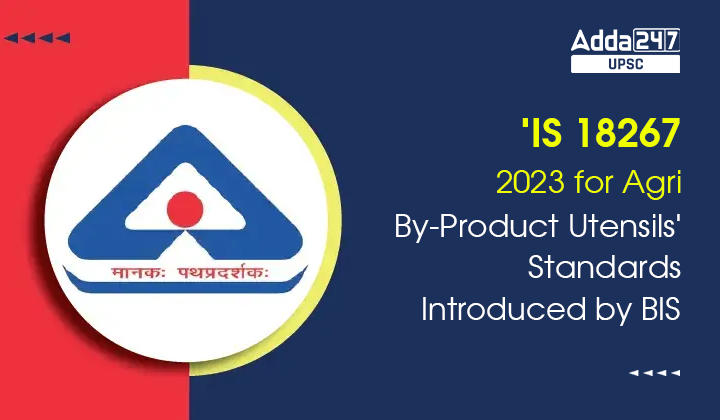Table of Contents
‘IS 18267: 2023 for Agri By-Product Utensils’ Standards: IS 18267: 2023 is a significant step towards promoting sustainable practices and reducing plastic waste in the food industry. By providing clear guidelines for manufacturers and instilling confidence in consumers, the standard facilitates the adoption of agri by-product utensils and contributes to a cleaner and greener environment. ‘IS 18267: 2023 for Agri By-Product Utensils’ Standards by BIS is also important for UPSC Prelims Exam and UPSC Mains Exam (GS Paper 2- Governance initiatives)
‘IS 18267: 2023 for Agri By-Product Utensils’ Standards in News
The publication of IS 18267: 2023 by the Bureau of Indian Standards (BIS) marks a significant step in addressing plastic pollution and promoting sustainability.
‘IS 18267: 2023 for Agri By-Product Utensils’ Standards
Titled “Food Serving Utensils Made from Agri By-Products – Specification,” this standard provides comprehensive guidelines for manufacturers and consumers, ensuring consistency in quality requirements across India.
- The implementation of this standard offers numerous advantages as it encourages the use of biodegradable utensils made from agricultural by-products.
- These utensils contribute to environmental safety by reducing plastic waste and promoting a circular economy.
- They are free from harmful additives, ensuring the well-being of consumers. Moreover, the standard creates economic opportunities for farmers and supports sustainable agricultural practices, contributing to rural development.
Global Market for Disposable Tableware
The global market for disposable tableware, driven by the increasing demand worldwide, has been on the rise. In 2020, the market size for disposable plates alone was valued at USD 4.26 billion, and it is projected to reach USD 6.73 billion by 2028, growing at a Compound Annual Growth Rate (CAGR) of 5.94% from 2021 to 2028.
‘IS 18267: 2023 for Agri By-Product Utensils’ Standards Highlights
In India, both large-scale enterprises and Micro, Small & Medium Enterprises (MSMEs) are actively involved in the production of biodegradable cutlery.
- The publication of this standard brings immense benefits to these manufacturers, as the demand for such products continues to grow, leading to an increase in the number of manufacturers in the sector.
- The standard covers various aspects, including the use of raw materials, manufacturing techniques, performance, and hygiene requirements for producing biodegradable utensils.
- It specifies the preferred use of agricultural by-products, such as leaves and sheaths, for making plates, cups, bowls, and more.
- Manufacturing techniques like hot pressing, cold pressing, moulding, and stitching are recommended.
- The standard also highlights the importance of smooth surfaces, non-sharp edges, and prohibits the use of chemicals, resins, and adhesives in the production process.
Significance of ‘IS 18267’ Standards
Overall, the introduction of this standard by the Bureau of Indian Standards is a commendable initiative that aligns with the global movement towards sustainability. It encourages the transition from conventional plastic utensils to eco-friendly alternatives, paving the way for a more environmentally conscious and responsible approach to food service.
Bureau of Indian Standards (BIS) Details
The Bureau of Indian Standards (BIS) plays a crucial role in ensuring quality, safety, and reliability in various sectors across India. Established in 1986 under the Bureau of Indian Standards Act, BIS is the national standards body of India and operates under the administrative control of the Ministry of Consumer Affairs, Food and Public Distribution. Its primary objective is to promote standardization and quality assurance of goods, services, and systems.
Bureau of Indian Standards (BIS) Functions
BIS has been instrumental in formulating and implementing standards that cover a wide range of industries and sectors, including agriculture, textiles, chemicals, electrical appliances, construction materials, and many more. These standards serve as benchmarks for manufacturers, consumers, and regulators, facilitating trade, consumer protection, and overall socio-economic development.
Revision of Indian Standards (IS)
One of the key functions of BIS is the formulation and revision of Indian Standards (IS) in collaboration with industry stakeholders, experts, and technical committees.
- These standards are based on national and international best practices, scientific research, and technological advancements.
- They establish the criteria for quality, safety, and performance, ensuring that products and services meet the desired standards.
Product Certification by BIS
BIS also operates a comprehensive product certification scheme, which allows manufacturers to obtain the prestigious ISI mark for their products.
- The ISI mark signifies compliance with Indian Standards and instills confidence among consumers about the quality and reliability of the products they purchase.
- BIS conducts regular inspections and audits to ensure that certified products continue to meet the required standards.
Other Functions
Apart from product certification, BIS also provides various other services to support industries and consumers.
- It operates testing laboratories for assessing the quality and performance of products, calibration services for measuring instruments, and a system for conformity assessment of products imported to India.
- BIS also offers training programs, workshops, and seminars to promote awareness and understanding of standards and quality management practices.
In recent years, BIS has taken significant steps to align Indian Standards with international standards, fostering harmonization and facilitating global trade. It actively participates in international standardization bodies and works towards mutual recognition of standards with other countries.
Conclusion
The Bureau of Indian Standards plays a pivotal role in promoting quality and standardization, ensuring consumer safety, and supporting the growth of industries in India. Its efforts contribute to enhancing the competitiveness of Indian products in the global market and building trust among consumers. With its commitment to excellence and continuous improvement, BIS remains a cornerstone of India’s quality infrastructure and a vital catalyst for economic development.
Indian Standards for Drinking Water | Bureau of Indian Standards (BIS)
| Follow US |
| UPSC Govt Jobs UPSC Current Affairs UPSC Judiciary PCS Download Adda 247 App here to get the latest updates |



 TSPSC Group 1 Question Paper 2024, Downl...
TSPSC Group 1 Question Paper 2024, Downl...
 TSPSC Group 1 Answer key 2024 Out, Downl...
TSPSC Group 1 Answer key 2024 Out, Downl...
 UPSC Prelims 2024 Question Paper, Downlo...
UPSC Prelims 2024 Question Paper, Downlo...
